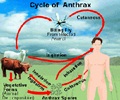Colombia has started selling rare species of animals to other countries cashing in on its status as one of the world's most biologically diverse countries. This activity of "biocommerce" is being viewed with unease by environmentalists.
The fledgling exports of exotic local fauna -- especially butterflies, beetles, fish and frogs -- to countries like the United States, Canada, Japan and the United Arab Emirates is being undertaken by 1,250 small Colombian companies, according to figures kept by the state-run Export Promotion Fund.But they have competition from illegal traffickers.
"Tinny," a trumpet beetle born in a nursery in the central province of Boyaca, has been a denizen of Kairakuen park in the Japanese city of Mito for the past two months. Its owner, Keiko Sato, traveled last week to a farm in rural Tunja, Colombia to find it a mate.
"These scarabs are very beautiful and symbolic. We have bought more than a dozen here in recent years to give to our friends' children in Japan, who turn them into pets that bring good luck," she told AFP.
She said she paid no more than four dollars apiece for the beetles.
Tierra Viva, a company whose name means "live earth," raises beetles and sells them alive or dead. German Viasus, its manager, said that after going through lots of red tape he can now profit from the trade in these creatures.
Advertisement
"We export beetles mainly to Japan, where they are admired and treated with respect and devotion, but we've begun to receive orders from the United Arab Emirates where one of the sheikhs is a fanatic about these marvellous exemplars and made an initial order for 1,000," he said.
Advertisement
"The language of love is universal and we find that people in love in any country are fascinated by colorful butterflies," said Vanesa Wilches, the manager of Alas de Colombia, or Wings of Colombia.
"So, we offer the cocoon so that the lovers can watch the larva grow and then they can free the butterfly as a symbol that seals their love," she said.
Over the past five years, this company has exported butterflies both live and preserved to countries like the Netherlands, Britain, the United States and France with annual sales close to 75,000 dollars.
Collectors and entrepreneurs from countries of the Far East, like Singapore, South Korea and China, meanwhile, buy fish from the eastern plains of Colombia through a fisherman's cooperative, Coopesca, whose manager is Jose Arturo Gomez.
For every manta ray they catch in the Orotoy River, local fishermen get no more than 50 US cents, but in Singapore, Malaysia or Japan it will command a price of more than 80 dollars, according to Gomez.
Parallel to the above ground commerce in exotic animals is an illegal trade, which Maria Sanchez, the coordinator of the Environmental Police, said is managed by a powerful international network.
In 2008 alone, Colombian authorities confiscated 54,000 exotic animals intended for sale both inside and outside the country.
"Despite campaigns to raise awareness, rural populations continue to sell species without regard for climate, which results in many of them dying in captivity," she said.
"They are bought and sold in popular markets without any kind of restraint or control."
Source-AFP
RAS









